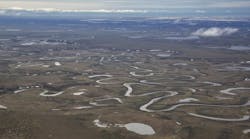By the OGJ Online Staff
WASHINGTON, DC, May 15 -- The White House Tuesday disclosed some of the conservation and efficiency proposals that will be included in President George W. Bush's energy strategy.
Bush is due to disclose the strategy during a speech in St. Paul, Minn., on Thursday. Senate Majority Leader Trent Lott (R-Miss.) said Tuesday that the Energy and Natural Resources Committee would hold hearings on the energy plan next week, with the goal of advancing a bill to the Senate floor in June.
In his weekly radio address last Saturday, Bush said the energy plan would encourage conservation.
"We are near the beginning of the summer driving and air conditioning season, the months of the year when energy use rises and energy prices jump. This year, like last year, gasoline and electricity prices are rising sharply, squeezing family budgets and disrupting the lives and work of our fellow Americans.
"Over the long term, the most effective way to conserve energy is by using energy more efficiently. For example, a new refrigerator uses 65% less power than a refrigerator built in 1972. Overall, we use 40% less energy to produce new goods and services than we did in 1973."
A White House fact sheet disclosed some of the policy recommendations from the National Energy Policy Development Group, chaired by Vice-Pres. Cheney.
It said businesses find combined heat and power (CHP) systems attractive, but replacing old, inefficient boilers with highly efficient CHP systems can add new regulatory requirements (such as air permits) without offering the same depreciation incentives the tax code grants to power plants.
It recommended Congress shorten the tax depreciation life for CHP projects to 7 years; that the US Environmental Protection Agency work with local and state governments to encourage the use of CHP and other clean power generation at brownfields sites; and that EPA allow more flexible permitting for CHP plants.
The White House said hybrid (gasoline/electric) or fuel cell vehicles are more fuel-efficient than standard autos, potentially doubling vehicle mileage.
A recent National Energy Laboratory Report indicates that the fuel economy of a typical automobile could be enhanced by 60% by increasing engine and transmission efficiency and reducing vehicle mass by about 15%. Several promising efficiency technologies are being presented to the US market. Automobile manufacturers are developing and have already introduced hybrid vehicles. Advanced lightweight materials offer up to 6% improvement in mileage for each 10% reduction in body weight.
It said the energy policy will recommend Congress provide an individual, temporary, income tax credit for purchase of new hybrid or fuel cell vehicles between 2002 and 2007.
The White House noted that the federal program promoting energy efficiency, Energy Star, has been limited.
It recommended the Department of Energy expand the program beyond office buildings to include schools, retail buildings, health care facilities, and homes, plus additional home products and appliances.
Also, EPA would develop and implement a strategy to increase public awareness of the potential savings from energy efficiency. "The typical homeowner can save 30% (about $400/year) on their home energy bill by using Energy Star-labeled products such as computers, air conditioners, and other products."

